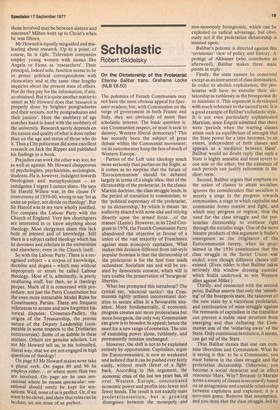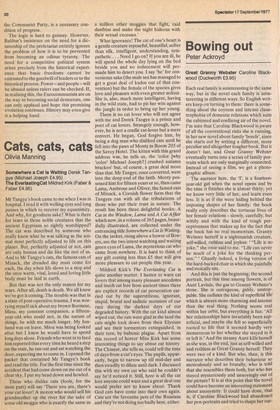Scholastic
Robert Skidelsky
On the Dictatorship of the Proletariat Etienne Balibar trans. Grahame Locke (NLB £6.50) The polemics of French Communists may not have the most obvious appeal for Spectator readers; but, with Communism on the verge of government in both France and Italy, they are obviously of more than scholastic interest. The basic question is: can Communism respect, ot must it seek to destroy, Western liberal democracy? This has recently been the subject of great debate within the Communist movement; on its outcome may hang the fate of much of Western Europe.
Parties of the Left take ideology much more seriously than parties on the Right, so it comes as no surprise that the future of 'Eurocommunism' should be debated largely in terms of a single idea: that of the dictatorship of the proletariat. In the.classic Marxist doctrine, the class struggle leads, in the period of transition to communism, to the 'political supremacy of the proletariat, to its dictatorship,' by which is meant `an authority shared with none else and relying directly upon the armed force. . .of the masses' (Lenin). However, at its 22nd Congress in 1976, the French Communist Party abandoned this objective in favour of a union of the vast majority of Frenchmen against state monopoly capitalism. What makes this decision different from old-style popular frontism is that the dictatorship of the proletariat is for the first time made redundant. Socialism can and will be created by democratic consent, which will in turn enable the preservation of 'bourgeois' liberties.
What has prompted this turnabout? The cynical say, 'electoral tactics': the Communists lightly jettison inconvenient doctrine to secure allies in a favourable situation. More fundamentally, if economic progress creates not more proletarians but more bourgeois, the only way Communism can grow is to broaden its appeal; hence the need for a new range of cosmetics. The aim of exercising power alone, ruthlessly, and permanently remains unchanged.
However, the shift is not to be explained entirely by opportunism. Capitalism, argue the Eurocommunists, is now so weakened and isolated that it can be pushed over fairly easily, without much threat of a fightback. According to this argument, the economic crisis of the last ten years has, all over Western Europe, concentrated economic power and profits into fewer and fewer hands. The result is not exactly mass proletarianisation, but a growing divergence between the monopoly and non-monopoly bourgeoisie, which can be exploited to radical advantage, but obviously not if the proletarian dictatorship is insisted upon.
Balibar's polemic is directed against this 'revisionist' view of policy and history. A • protege of Althusser (who contributes an afterword), Balibar makes three main points in reply.
Firstly, the state cannot be conceived except as an instrument of class domination. In order to abolish exploitation, the proletariat will have to exercise their dictatorship as ruthlessly as the bourgeoisie do to maintain it. This argument is developed with much reference to the sacred texts. It is a good example of Balibar's scholastic style. It is not even particularly sophisticated Marxism, since Engels admitted that there were 'periods when the warring classes attain such an equilibrium of strength that the State power for a time becomes, to an extent, independent of both classes ,and appears as a mediator between them'. Balibar would no doubt reply that such a State is highly unstable and must revert to one side or the other; but the existence of such periods can justify reformism in the short term.
Second, Balibar argues that emphasis on the union of classes to attain socialism ignores the consideration that socialism is merely a stage in the progress towards communism, a stage in which capitalist and communist forms coexist and fight, and which may progress or regress; thus the need for the class struggle and the proletarian dictatorship to continue right through the socialist stage. One of the more bizarre products of this argument is Stalin's emergence as the originator of the Eurocommunist heresy, when he proclaimed in the 1936 constitution that the class struggle in the Soviet Union was ended„ even though different classes still existed. (Even odder is that Balibar takes seriously this window dressing exercise which Stalin undertook to win Western allies against Hitler.) Thirdly, and connected with the second point, Balibar asserts that only the 'smashing' of the bourgeois state, the takeover of the new state by a victorious proletariat, and continuation of mass struggle against the remnants of capitalism in the transition can prevent a stable state structure from• emerging ' and thus defeating the Communist aim of the 'withering away' of the State. Only continuous revolution, it seems, can get rid of the State.
Thus Balibar denies that one can combine liberalism and Communism. What he is saying is this: to be a Communist, you must believe in the class struggle and the proletarian dictatorship. Otherwise, you become a social democrat and in effect renounce Marx. Why? Because in Marxist terms a society of classes is necessarily based on an antagonistic and unstable relationship between exploiters and exploited; it is a zero-sum game. Remove that assumption, and you deny that the class struggle, led by the Communist Party, is a necessary condition of progress.
The logic is hard to gainsay. However, Balibar's insistence on the need for a dictatorship of the proletariat entirely ignores the problem of how it is to be prevented from becoming an odious tyranny. The need for a competitive political system arises precisely from the historical experience that basic freedoms cannot be entrusted to the goodwill of leaders or to the historical process. Power — and people — will be abused unless rulers can be checked. If, in realising this, the Eurocommunists are on the way to becoming social democrats, one can only applaud and hope this promising evolution continues. History may even give it a helping hand.































 Previous page
Previous page